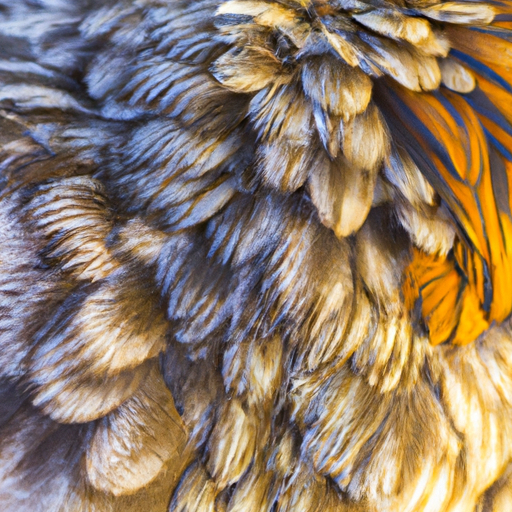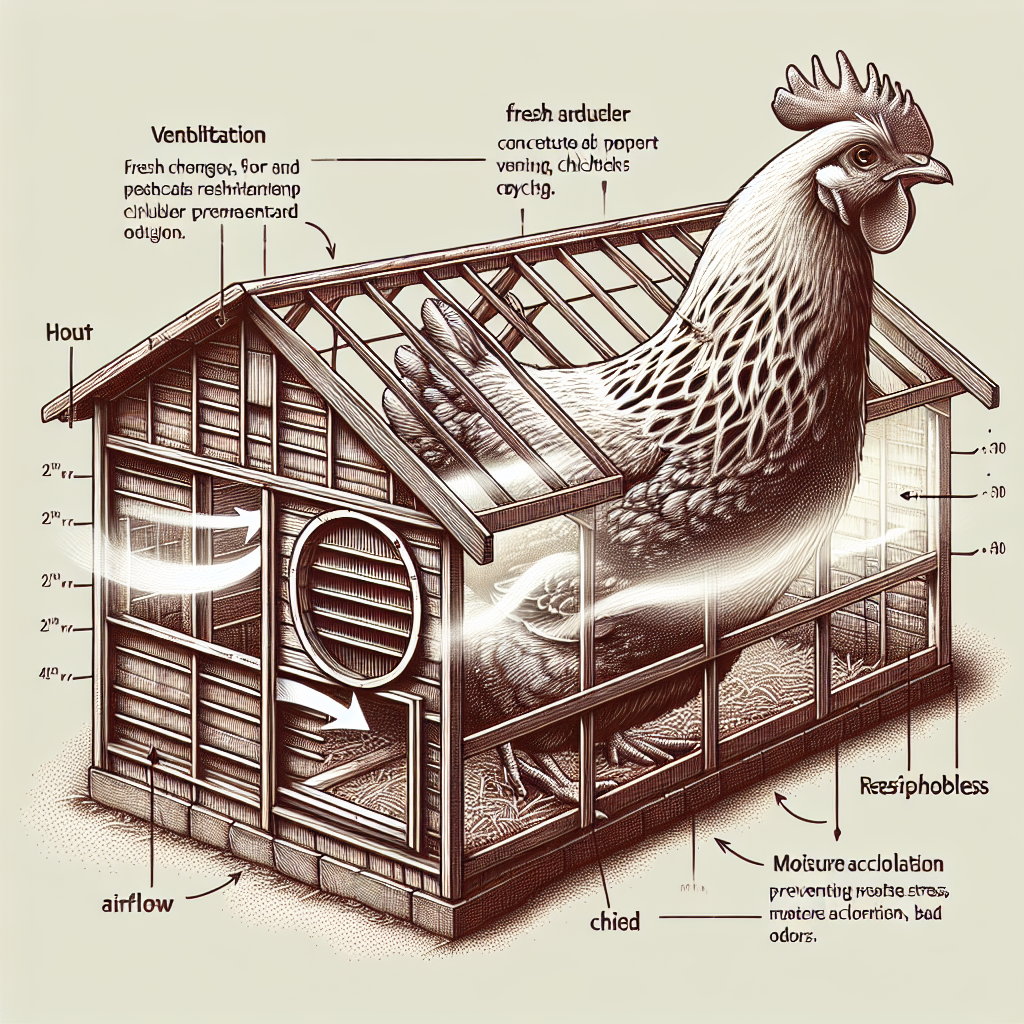As a chicken owner, it is essential to ensure the health and well-being of your flock. Regular health checks play a vital role in preventing diseases and maintaining the overall productivity of your chickens. Understanding the frequency at which you should conduct these checks is crucial for the success and longevity of your flock. By staying proactive and implementing regular health checks, you can detect any illnesses or abnormalities early on, allowing for prompt treatment and preventing potential outbreaks. In this article, we will explore the optimal frequency for conducting health checks on your chicken flock, providing you with valuable insights and guidelines to ensure the health and happiness of your feathered friends.
Factors to consider
When it comes to the health of your chicken flock, there are several factors that you should take into consideration. These factors can impact the overall well-being of your chickens and play a crucial role in determining how frequently you should conduct health checks. Here are some important factors to keep in mind:
Chicken breed
Different chicken breeds have varying levels of susceptibility to diseases and health issues. Some breeds may be more prone to certain illnesses, while others may have a higher resistance. It is important to know the specific characteristics and health risks associated with your chicken breed in order to tailor your health checks accordingly.
Chicken age
The age of your chickens can also play a role in how frequently you should conduct health checks. Young chicks are more vulnerable to certain diseases and infections, and therefore may require more frequent monitoring. As chickens grow older, their immune systems become stronger, but they may still be susceptible to age-specific health issues. Adjust your health check schedule based on the age of your flock.
Health history
Knowing the health history of your chickens is vital in determining the frequency of health checks. If you have recently introduced new chickens to your flock or if any of your chickens have a history of health problems, it is important to monitor them more closely. Regular health checks can help detect any recurring issues and ensure appropriate interventions.
Environmental conditions
The environment in which your chickens live can have a significant impact on their health. Factors such as temperature, humidity, ventilation, and cleanliness can all influence the well-being of your flock. If your chickens are exposed to extreme weather conditions or poor sanitation, it is essential to conduct health checks more frequently to catch any potential issues early on.
Exposure to other animals
If your chickens interact with other animals, such as dogs, cats, or wild birds, it increases the risk of exposure to diseases and parasites. Regular health checks are necessary to monitor for any signs of illness that may have been transmitted from other animals. Additionally, if your chickens are frequently in contact with other flocks, such as at poultry exhibitions or shows, more frequent health checks may be necessary.
Weekly Health Checks
In order to maintain the overall health of your chicken flock, it is important to conduct regular weekly health checks. These checks allow you to monitor the general well-being of your chickens and catch any early signs of illness. Here are some key aspects to focus on during your weekly health checks:
Inspecting general appearance
During a weekly health check, take a close look at your chickens’ general appearance. They should have bright eyes, vibrant feathers, and an overall healthy appearance. Any signs of dullness, ruffled feathers, or weight loss should be noted and investigated further.
Checking for signs of illness
Be vigilant in observing any signs of illness during your weekly health checks. This includes looking out for symptoms such as sneezing, coughing, lethargy, or abnormal feces. If you notice any of these signs, it may be an indication of an underlying health issue that needs to be addressed.
Monitoring appetite and water intake
Healthy chickens have a good appetite and drink an appropriate amount of water. During your weekly health checks, observe their eating and drinking habits. A sudden decrease in appetite or a significant change in water intake could be a sign of an underlying health problem.
Monthly Health Checks
In addition to the weekly health checks, monthly health checks allow for a more in-depth assessment of your chicken flock’s well-being. By conducting these checks, you can identify any underlying health issues that may require further attention. Here are the areas to focus on during your monthly health checks:
Inspecting feet and legs
The condition of your chickens’ feet and legs can provide valuable insights into their overall health. Check for any signs of swelling, cuts, or injuries. Pay attention to their ability to walk or perch comfortably, as any lameness or difficulty in mobility may indicate health issues.
Checking eyes and beak
During your monthly health checks, closely examine your chickens’ eyes and beak. Their eyes should be clear and free from discharge, while their beak should be intact and properly aligned. Any abnormality in these areas could be a sign of an underlying health problem.
Examining feathers and skin
The condition of your chickens’ feathers and skin can reveal a lot about their health. Look for signs of feather loss, mites, lice, or any abnormalities such as bald patches or skin lesions. These can be indications of external parasites or underlying health issues that require attention.
Observing behavior and activity level
Monitoring your chickens’ behavior and activity level is an essential part of monthly health checks. Healthy chickens are active, alert, and display normal behaviors such as scratching, dust bathing, and foraging. Any significant changes in behavior, such as aggression, lethargy, or abnormal vocalizations, should be noted and further investigated.
Seasonal Health Checks
Seasonal health checks are necessary to account for specific health concerns that may arise during different times of the year. Environmental conditions and the natural reproductive cycles of chickens can make certain health issues more prevalent during specific seasons. Here are the areas to focus on during seasonal health checks:
Monitoring temperature regulation
Chickens are susceptible to temperature extremes, particularly during hot summers or cold winters. During seasonal health checks, pay close attention to their ability to regulate body temperature. Signs of heat stress or frostbite should be addressed promptly to ensure the well-being of your flock.
Examining respiratory system
Respiratory diseases can be more common in certain seasons, especially during periods of high humidity or cold weather. Regularly examine your chickens’ respiratory system for any signs of coughing, sneezing, wheezing, or nasal discharge. Respiratory issues can quickly spread through a flock, so early detection is crucial.
Inspecting reproductive health
During specific seasons, such as spring or fall, chickens may go through reproductive cycles, including egg-laying or broodiness. Conducting seasonal health checks allows you to monitor their reproductive health and detect any abnormalities, such as egg binding or reproductive infections. Timely intervention can prevent complications and ensure the reproductive health of your flock.
Annual Health Checks
Annual health checks provide a comprehensive assessment of your chicken flock’s overall well-being. By conducting these checks on a yearly basis, you can ensure that your chickens receive appropriate care and any underlying health issues are addressed proactively. Here are the key aspects to focus on during your annual health checks:
Comprehensive physical examination
During an annual health check, it is important to conduct a thorough physical examination of each chicken. This includes checking their body condition, body weight, and overall muscle tone. Assess their overall health status and look for any signs of illness or abnormalities that may have gone unnoticed in previous checks.
Vaccination schedule
Consult with a veterinarian to establish a vaccination schedule for your chicken flock. Annual health checks provide an opportunity to administer any necessary vaccinations and ensure that your flock is protected against common diseases. Vaccinations can significantly reduce the risk of outbreaks and improve the overall health of your chickens.
Parasite control
Addressing parasite infestations is crucial for maintaining the health of your flock. An annual health check allows you to assess the parasite burden on your chickens and implement appropriate control measures. This may include deworming medication, dusting for external parasites, or treating for mites and lice.
Nutritional assessment
A balanced and nutritious diet is essential for the health and productivity of your chickens. During your annual health checks, evaluate their nutritional status and assess the quality of their diet. Make any necessary adjustments or seek professional advice to ensure that your chickens receive the proper nutrients they need to thrive.
Signs of Healthy Chickens
Knowing the signs of healthy chickens is crucial in assessing the success of your regular health checks and overall flock management. Here are some key indicators of a healthy chicken:
Bright eyes
Healthy chickens have clear, bright eyes. Dull or cloudy eyes can be a sign of illness, so be sure to monitor this during your health checks.
Glossy feathers
Chickens with healthy feathers have a vibrant, glossy appearance. Feathers that appear dull, ragged, or falling out may indicate health issues or parasite infestations.
Clear nostrils
During your health checks, check your chickens’ nostrils for any signs of congestion or discharge. Clear nostrils indicate a healthy respiratory system.
Energetic behavior
Healthy chickens are active, alert, and display normal behaviors. They should be actively foraging, scratching, and engaging in social interactions with other flock members.
Good appetite and water intake
A healthy chicken will have a good appetite and drink an appropriate amount of water. If you notice any significant changes in their eating or drinking habits, it may be a sign of underlying health problems.
Common Health Issues
Despite your best efforts, chickens can still encounter various health issues. Being aware of these common problems can help you identify potential issues during your health checks. Here are some of the most common health issues that chickens may experience:
Respiratory infections
Chickens are susceptible to respiratory infections, such as infectious bronchitis or avian influenza. Noticeable symptoms may include coughing, sneezing, nasal discharge, and difficulty breathing.
Digestive disorders
Digestive disorders in chickens can manifest as diarrhea, weight loss, or abnormal feces. Conditions such as impacted crop, sour crop, or coccidiosis can cause digestive issues and require prompt attention.
Parasitic infestations
External parasites, such as mites and lice, can cause discomfort and irritation in chickens. Internal parasites, including worms and coccidia, can lead to poor growth, reduced egg production, and overall weakness.
Reproductive problems
Egg-laying issues, such as egg binding or reproductive infections, can occur in hens. These problems can result in decreased egg production or reproductive complications that require veterinary intervention.
Injuries and wounds
Chickens can experience injuries from fights, predator attacks, or accidents within the coop. Wounds should be treated promptly to prevent infection and promote healing.
Actions to Take When a Problem is Identified
If you identify a problem during your health checks, it is important to take appropriate actions to address the issue and prevent further complications. Here are the steps to follow when a problem is identified:
Isolate the affected bird
If a chicken is showing signs of illness or injury, it is important to isolate them from the rest of the flock. This helps prevent the spread of any contagious diseases or parasites and allows you to provide individualized care.
Consult a veterinarian
When dealing with health issues in chickens, consulting a veterinarian who specializes in poultry is highly recommended. They can provide expert guidance, diagnose the problem, and recommend appropriate treatment options.
Implement appropriate treatment
Following the veterinarian’s advice, implement the necessary treatment plan for the affected bird. This may include administering medications, providing supportive care, or implementing specific management practices to address the problem.
Preventive measures for the flock
Once the problem is identified and treated, it is essential to take preventive measures to protect the entire flock. This may involve implementing biosecurity measures, such as regular cleaning and disinfection of the coop, vaccination protocols, and monitoring for any signs of recurrence or new health issues.
The Importance of Regular Health Checks
Regular health checks are crucial for the overall well-being and productivity of your chicken flock. By conducting these checks, you can ensure early detection of diseases, prevent and control outbreaks, and optimize the health and productivity of your chickens. Here are some key reasons why regular health checks are important:
Early detection of diseases
Regular health checks allow you to spot any signs of illness or abnormalities before they escalate into more serious conditions. Early detection enables prompt intervention, increasing the chances of a successful recovery and preventing the spread of diseases within the flock.
Prevention and control of outbreaks
By conducting regular health checks, you can identify any potential health issues or signs of disease outbreaks in their early stages. This allows you to implement necessary control measures, such as isolation, treatment, or vaccination, to prevent the spread of diseases and protect the entire flock.
Optimization of flock health and productivity
Regular health checks help maintain the overall health and productivity of your chicken flock. By monitoring their well-being, you can make informed management decisions, address any health concerns promptly, and provide the necessary care to ensure optimal growth, egg production, and overall flock performance.
Resources for Chicken Health
Ensuring the health of your chicken flock requires access to reliable information and support. Here are some resources that can provide valuable guidance and assistance:
Publications and websites
Numerous publications and websites focus on poultry health and provide valuable information on various topics. These resources often cover everything from basic care and management practices to specific health issues and treatment options. Be sure to consult reputable sources and stay updated on the latest advancements in poultry health care.
Local poultry clubs or associations
Joining local poultry clubs or associations can provide you with a network of experienced poultry keepers who can offer advice and support. These organizations often organize workshops, seminars, and events where you can learn from experts in the field and stay connected with fellow chicken enthusiasts.
Veterinary professionals specializing in poultry
Establishing a relationship with a veterinarian who specializes in poultry health is invaluable. These professionals have the knowledge and expertise to address any health concerns or emergencies that may arise. They can provide guidance on preventative measures, disease management, and treatment options specific to your flock’s needs.
In conclusion, conducting regular health checks on your chicken flock is essential for maintaining their well-being and preventing potential health issues. By considering various factors such as chicken breed, age, health history, environmental conditions, and exposure to other animals, you can determine the frequency of your health checks. Weekly, monthly, seasonal, and annual health checks all play important roles in monitoring different aspects of your flock’s health. Regular health checks allow for early detection of diseases, prevention and control of outbreaks, and optimization of flock health and productivity. By being attentive to the signs of healthy chickens and common health issues, and taking appropriate actions when a problem is identified, you can provide the best possible care for your beloved flock. Remember to utilize a combination of resources, such as publications, local poultry clubs, and veterinary professionals specializing in poultry, to ensure that you have access to up-to-date information and support for your chicken’s health needs.




